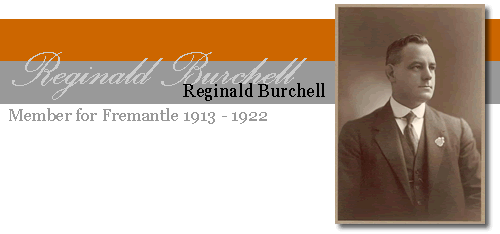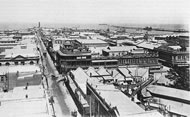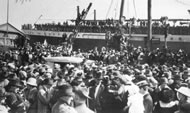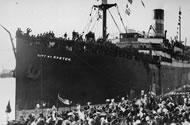
Reginald John Burchell was born in North Adelaide, South Australia, on 18 May 1883, son of police corporal Thomas Tupper Burchell and his wife Annie Ridge. His primary education was at state schools in South Australia but he came to Western Australia in 1897 while still in his teens, becoming a railwayman and a member of the WA Railways Employees Union and serving in the local militia from 1900 to 1903.
In 1906 he married his first wife Linda Robinson by whom he had one son and two daughters. Between 1911 and 1913 Burchell was chairman of the Cottesloe Road Board and in October 1911 as an ALP candidate he unsuccessfully contested the Legislative Assembly seat of Claremont. Two years later he entered the House of Representatives defeating sitting Fremantle MHR William Noah Hedges by more than 3000 votes and in the following year in the double dissolution election he increased his majority further over a new candidate representing the Liberal party.
Burchell was expelled from the ALP over the issue of conscription but retained the Fremantle seat as a Nationalist in 1917 and 1919, with majorities of nearly 12000 and 5,700 respectively, before retiring from politics in 1922 when barely forty years old. During his years in the parliament he served on the Joint Committee of Public Accounts, was Government Whip for both the Labor and Nationalist parties, and was a member of the Royal Commission on Powellised Timbers1 between 1914 and 1917. From January 1917 (embarking overseas in May and arriving in France in October) to June 1919 he served in the AIF reaching the rank of Acting Lieutenant Colonel. While serving with the 4th Railway Operation Section Unit as a Lieutenant in May 1918 Burchell was awarded the Military Cross (gazetted July 1918).
The citation for the award read:
For conspicuous gallantry and devotion to duty in controlling railway operations which involved the moving of troops and rolling stock and also the evacuation of the wounded. He worked with limited facilities, for three days and nights continuously. It was due to his care and watchfulness that a successful evacuation was rendered possible, and that engines and rolling stock did not fall into the hands of the enemy. (London Gazette, 26 July 1918)
Burchell married again in 1921 in Melbourne and with second wife Violet Farey had a further three children (one son and two daughters). After leaving Parliament Burchell lived in Melbourne as manager with Hoadleys Chocolates and then in Adelaide and Sydney as manager of the MGM Film Company. After two years of unemployment he became chief administrative officer of Radio Interest Ltd, one of the founder companies which formed Amalgamated Wireless Australasia. At the time of his retirement through ill health in 1945 he was manager of Licensed Patents Dept. Burchell, who had been an active Freemason died in Mosman, New South Wales, on 20 June 1955.
1. Powellised timber was developed through a heating process designed to preserve the timber. First developed in South Australia it was the basis for timber milling in Powelltown in Victoria but the process was eventually deemed a failure. Back


